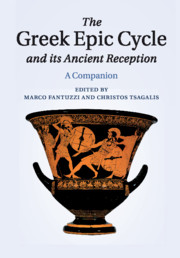Book contents
- Frontmatter
- Contents
- List of illustrations
- List of contributors
- Editorial note
- Introduction: Kyklos, the Epic Cycle and Cyclic poetry
- PART I APPROACHES TO THE EPIC CYCLE
- PART II EPICS
- 11 Theogony and Titanomachy
- 12 Oedipodea
- 13 Thebaid
- 14 Epigonoi
- 15 Alcmeonis
- 16 Cypria
- 17 Aethiopis
- 18 Ilias parva
- 19 Iliou persis
- 20 Nostoi
- 21 Telegony
- PART III THE FORTUNE OF THE EPIC CYCLE IN THE ANCIENT WORLD
- Works cited
- Index of principal passages
- Index nominum et rerum
14 - Epigonoi
from PART II - EPICS
Published online by Cambridge University Press: 05 August 2015
- Frontmatter
- Contents
- List of illustrations
- List of contributors
- Editorial note
- Introduction: Kyklos, the Epic Cycle and Cyclic poetry
- PART I APPROACHES TO THE EPIC CYCLE
- PART II EPICS
- 11 Theogony and Titanomachy
- 12 Oedipodea
- 13 Thebaid
- 14 Epigonoi
- 15 Alcmeonis
- 16 Cypria
- 17 Aethiopis
- 18 Ilias parva
- 19 Iliou persis
- 20 Nostoi
- 21 Telegony
- PART III THE FORTUNE OF THE EPIC CYCLE IN THE ANCIENT WORLD
- Works cited
- Index of principal passages
- Index nominum et rerum
Summary
The Epigonoi is the third poem of the Theban cycle centered on the family of Oedipus: it dealt with the generation of his grandsons. The title (Ἐπίγονοι = ‘The afterborn, the younger men’) and the opening line (PEG F 1 = D., W.: Νῦν αὖθ’ ὁπλοτέρων ἀνδρῶν ἀρχώμεθα, Μοῦσαι ‘and now, Muses, let us begin with the younger ones/those born after’) point to a close connection with the preceding poem, the Thebaid, which dealt with the feud between Eteocles and Polynices and with the first war of Argos against Thebes. Consequently, the Epigonoi was centered on the second expedition against Thebes waged 10 years later by the sons of the Seven. The continuity of the subject matter is matched by the equal length of the poems: according to the source which also quotes their beginnings, they both numbered 7,000 lines (Certamen Homeri et Hesiodi 15, 256–8 Allen = Epig. PEG T 1 = 2 D.). The poem presents a number of unsolved problems regarding its origin, dating, arrangement, and relation to other epic poems now lost (the Thebaid, the Alcmeonis, the Trojan epics).
Authorship
The strong narrative bond with the Thebaid may have facilitated the attribution of the Epigonoi to Homer, although some doubts regarding the Homeric autorship of the poem surface as early as the fifth century BC with Herodotus: after recalling that the Hyperboreans are mentioned by ‘Hesiod’ (cf. Hes. F 150.21 M.-W. = F 63.21 Hirsch.), he continues ‘…and so does Homer in the Epigonoi, if Homer really composed this poem’ (Herod. 4.32 = Epig. PEG F 2 = D., 5 W.). In a later period, after quoting the opening lines of the Thebaid and of the Epigonoi (see above), the compiler of the Certamen casts the same doubt on Homeric paternity by adding ‘some say that this too is the work of Homer’ (Cert. 15 (260 Allen) ϕασὶ γάρ τινες καὶ ταῦτα 'Ομήρου εἶναι).
Herodotus' quotation of the poem proves that in the classical age there circulated one poem Epigonoi distinct from the Thebaid, which was believed to be Homeric.
- Type
- Chapter
- Information
- The Greek Epic Cycle and its Ancient ReceptionA Companion, pp. 244 - 260Publisher: Cambridge University PressPrint publication year: 2015
- 2
- Cited by



